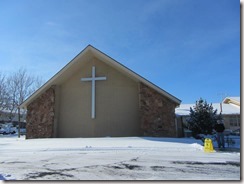 The Bible is all about disruption. The purpose of the preaching of the Word and the mission of the church in general is to disrupt.
The Bible is all about disruption. The purpose of the preaching of the Word and the mission of the church in general is to disrupt.
Fellowship is not simply about connection, it’s also about protection from the enemy and about disruption in the heart of God’s people. As we fellowship in union with Christ and in communion with each other to build up each other in Christ, we connect to protect each other from the enemy
In Titus 1:9, we read about giving instruction in sound doctrine and also to rebuke those who contradict it? This is the point of 10-16. In our fellowship, our protection radar is out. Then in verse 10: “For there are many who are insubordinate, empty talkers an deceivers, especially those of the circumcision party.” Circumcision party are those called Judaizers, who insisted that in order to follow Christ, you must still keep the law of Moses.
In connecting with a body of believers, elders are not only to inspect those wanting to connect, but also do detect false doctrine and false living among God’s people in a three-fold process: identify, silence, and rebuke. We inspect to detect because others will be affected.
We identify them by their insubordination. Paul commanded Titus to place elders in each town to keep the church in order. The order is that of a doctrinal, purity order. These folks were adding much to the pure gospel of Christ and telling them, “You are to stay true with sound ‘words’ (doctrine), but you’re coming in denying the sound words the elders preach (subordinate) with ‘useless words’ and lies.” Our heavenly status is not secured by human accomplishments.
First Corinthians 11 contains a passage I read most every time we partake of the Lord’s Supper. In outlining some of the sinful issues, Paul noted, “For, in the first place, when you come together as a church, I hear that there are divisions among you. And I believe it in part, for there must be factions among you in order that those who are genuine among you may be recognized” (1 Corinthians 11:18-19). God brings necessary divisions to identify fractious people.
We silence them for the flock’s protection (11-12). Paul warned them that they upset whole families for personal gain. Our teachings and thinkings, if you will, have consequences, both good and bad. Trustworthy teaching from sound doctrine provides a protective and helpful consequence. Empty talking and Christ-plus teaching does not.
Paul includes a curious statement by a Cretan ‘prophet’ who noted, “Cretans are always liars, evil beasts, lazy gluttons.” This is a difficult assessment of the culture in which Paul is in—his agreement (tongue in cheek, possibly)—but
Kent Hughes tells of the time when a faithful pastor went on vacation, and in his place a nationally known speaker filled his pulpit. At first, the man talked plainly about the gospel and faith in Jesus Christ, but then went on to suggest that anyone whose faith was genuine also had a particular view about American history and a certain political party. The damage done was significant, and this caring pastor let him know. Why? The pastor responded,
“You may think that courtesy would restrain me from speaking strongly to you about what was said in my absence, but when it comes to protecting my people from a gospel polluted by human conditions, I am like a she-bear protecting her cubs.”1
The same could be said of heresy, preaching one end times view over another as a test of faith, church attendance, denominational affiliation, the type of Bible you must read—these matters must be identified and silenced! This is adding to the requirements of being a believer in Christ.
We rebuke for the believer’s salvation (13-14). Why would we rebuke? Shouldn’t we simply leave them laying in the dust? No, we rebuke so “that they may be sound in the faith.”
What’s sad is how many churches run away from these principals! For many, the worst thing that can happen to a church is for disruption to take place. The avoidance of leaders inspecting the belief’s of members before connecting is not Christ’s idea of protecting His church or His flock. When Mark Twain observed the church, he noted that the church is about nice people hearing a nice sermon about how to be nice.
In 2 Timothy 4:3-4:
3 For the time is coming when people will not endure sound teaching, but having itching ears they will accumulate for themselves teachers to suit their own passions, 4 and will turn away from listening to the truth and wander off into myths.
The tonic? Preach the Word (2 Timothy 4:2). Listen to the commands of God, not of people. Listen to truth, not to myths. Listen to the message of Christ, not Christ-plus. Yes, the Word disrupts.
And that’s a good thing! The message of the cross is scandalous, an offence! It disrupts. But a disruption will take place one way or the other. Either the truth will disrupt the sin and falsehood, or (if we ignore the truth), sin and falsehood will disrupt the body.
May God bring us those much-needed holy disruptions.

 As many of you have figured out, I’ve developed a love for the game of soccer. What started out as an intentional decision (“OK, I’m going to watch soccer for a year to see what it’s about!”) has grown into a genuine fondness. Sure, basketball, baseball, and football are fine–but little gets me going in the sports world like some good soccer.
As many of you have figured out, I’ve developed a love for the game of soccer. What started out as an intentional decision (“OK, I’m going to watch soccer for a year to see what it’s about!”) has grown into a genuine fondness. Sure, basketball, baseball, and football are fine–but little gets me going in the sports world like some good soccer. Over the past year, I have found my mind drifting toward how cultures develop in organizations–especially churches, but organizations in general. This came to my mind on Saturday. I participate in a
Over the past year, I have found my mind drifting toward how cultures develop in organizations–especially churches, but organizations in general. This came to my mind on Saturday. I participate in a 
 A number of years ago, I came across C. John Miller’s book
A number of years ago, I came across C. John Miller’s book  We are going through a very interesting process at our church. In many business practices, this is called a systems analysis. The idea behind this Team is to analyze the various systems and structures in our church to see if they are moving the mission of our church and the vision of our church forward, or are some of the systems operating as obstacles to moving this forward. I am thrilled that our church is at the point where we can begin to look at how we get things done from a biblical and practical standpoint.
We are going through a very interesting process at our church. In many business practices, this is called a systems analysis. The idea behind this Team is to analyze the various systems and structures in our church to see if they are moving the mission of our church and the vision of our church forward, or are some of the systems operating as obstacles to moving this forward. I am thrilled that our church is at the point where we can begin to look at how we get things done from a biblical and practical standpoint. 


 All of us as church leaders lament the wide open back door that many churches that see many church members and attenders leave the church. In my 20+ years of ministry, this is what I see.
All of us as church leaders lament the wide open back door that many churches that see many church members and attenders leave the church. In my 20+ years of ministry, this is what I see.  Hi. My name is Matthew Perry, and I pastor a semi-traditional, multigenerational Baptist church.
Hi. My name is Matthew Perry, and I pastor a semi-traditional, multigenerational Baptist church.